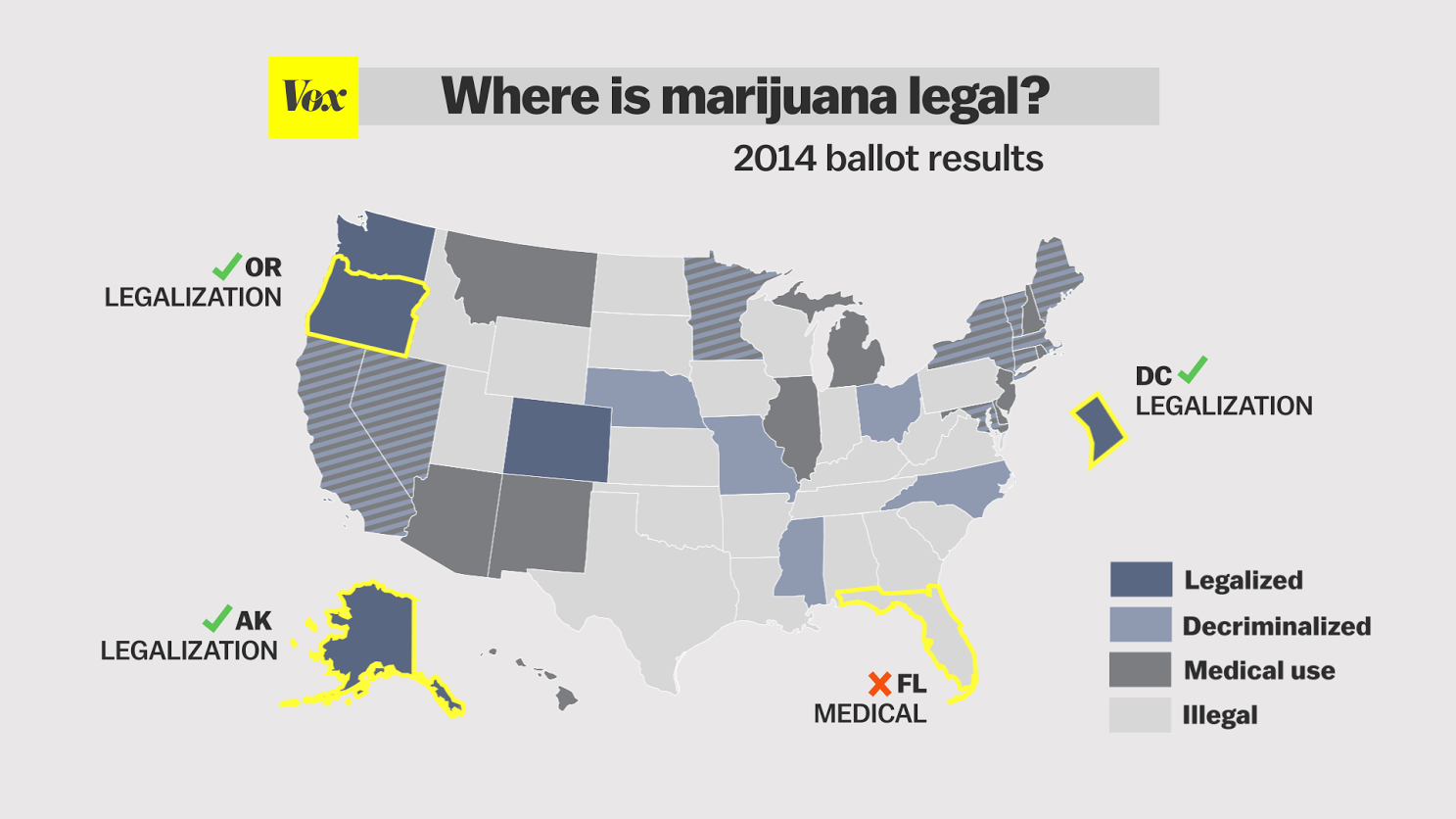What is the ballot initiative in Alaska?
:no_upscale()/cdn.vox-cdn.com/uploads/chorus_asset/file/2371592/Alaska_1.0.jpg)
Green northern lights dance across the sky in Alaska. (Anchorage Daily News / Tribune News Service via Getty Images)
Alaska's Ballot Measure 2 allows adults 21 and older to possess up to one ounce of pot and maintain six marijuana plants. The measure legalizes production and sales, which the Alcoholic Beverage Control Board — or a Marijuana Control Board, if one is created — will regulate. The measure also taxes marijuana at the point of sale at $50 per ounce.
Did it pass?
Yes. With all precincts reporting, the measure passed with 52.1 percent of the vote.
Can I legally smoke and buy pot right now?
:no_upscale()/cdn.vox-cdn.com/uploads/chorus_asset/file/2429816/Alaska_marijuana_legalization.0.png)
What made Alaska different?
:no_upscale()/cdn.vox-cdn.com/uploads/chorus_asset/file/2371598/Alaska_2.0.jpg)
Alaska is one of the few states with sea otters and glaciers. It's also unique for its libertarian history with marijuana. (Saul Loeb / AFP via Getty Images)
Although it's a Republican stronghold, Alaska, through a court ruling, was one of the first states to decriminalize marijuana in 1975, and voters in 1998 legalized the drug for medicinal purposes.
But Alaska's legislators have not supported the judicial and electoral decisions, and have maintained laws that keep marijuana illegal outside of people's homes. There's no system for medical marijuana dispensaries in the state, which means patients have no place to buy the drug even after it's prescribed by their doctors.
"We have thousands of cardholders in the state who have no safe way to access their medicine," said Taylor Bickford, a spokesperson for the Campaign to Regulate Marijuana Like Alcohol in Alaska. "They're forced to criminalize themselves and engage in the black market in order to gain access to the medicine that they've been prescribed to by their doctor."
The disconnect is a result of the nuances of Alaska's politics. Although Alaskan voters — and the state constitution, which maintains strong protections for rights to privacy — are conservative in a fairly libertarian sense, lawmakers are more traditionally conservative when it comes to marijuana.
Part of the legalization initiative's purpose, according to supporters, is to reinforce Alaska's existing laws for decriminalization and medical marijuana. If legislators aren't going to uphold such policies, then an initiative that allows marijuana possession and dispensaries across the state could.
Of course, the measure goes much further than merely protecting existing laws for marijuana. Alaska became the fourth state to legalize marijuana after Colorado, Washington, and Oregon. Some in the opposition were calling for the state to slow down and wait to see how legalization efforts pan out elsewhere.
"What's the rush?" asked Charles Fedullo, a spokesperson for the opposition campaign Vote No on 2. "We've already seen concerns come from public safety officials in Colorado."
What did local supporters say?
:no_upscale()/cdn.vox-cdn.com/uploads/chorus_asset/file/2371604/Alaska_3.0.jpg)
Supporters of legalization want to bring the underground market into legal, regulated shops, like those seen in Colorado. (Aaron Ontiveroz / Denver Post via Getty Images)
Bickford, a spokesperson for the Campaign to Regulate Marijuana Like Alcohol in Alaska, said the campaign focused on how intrusive prohibition can be for Alaskans who do nothing illegal besides use marijuana.
"This is a conservative state, but it's a state with a heavy libertarian streak," Bickford said. "People here generally want to be left alone and really don't think the government is the solution to their problems."
Alaskans are tired of "the failed policies of prohibition," Bickford said. He pointed to an American Civil Liberties Union report that found that, despite decriminalization in the state, thousands of Alaskans are arrested for marijuana possession each year at a cost of nearly $8.5 million to law enforcement.
One of the prominent concerns with legalization is that it will lead to increased use, which studies show has been the case for adults — but not teens — in states that allow medical marijuana. But Bickford said prohibition was already failing to hold down pot use in Alaska, which has more marijuana users per capita than the rest of the country. In his view, legalizing possession and sales couldn't and wouldn't increase rates much further.
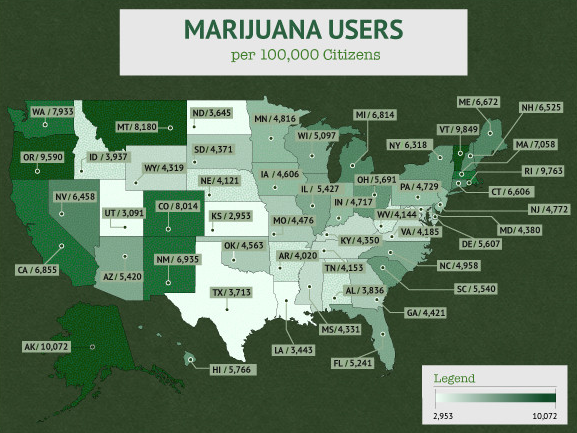
"We're not talking about introducing [marijuana] to the state for the first time," Bickford said. "We're talking about moving it out of the criminal underground into a regulated environment."
What did local opponents say?
:no_upscale()/cdn.vox-cdn.com/uploads/chorus_asset/file/2371608/Alaska_4.0.jpg)
A teenager with a marijuana joint. (PYMCA / Universal Images Group via Getty Images)
Fedullo, a spokesperson for Vote No on 2, said the campaign had concerns about Colorado's experiences with marijuana legalization, arguing that teen marijuana use, which could lead to developmental problems, increased in Colorado after the legalization of medical marijuana.
Data on teen marijuana use in Colorado for 2014, the first year retail sales began in the state, is unavailable. But Colorado's rates of teen marijuana use have actually dropped since 1999, even after medical marijuana dispensaries opened widely after 2007 and possession was fully legalized in December 2012.

Fedullo also expressed a concern shared by legalization advocates and opponents alike — that the commercialization of marijuana will encourage the for-profit pot industry to market its product to the people who are most vulnerable to drug abuse, including teens. That could, he argued, lead to more drug abuse.
Then there's dabbing, in which a highly concentrated marijuana-based oil is vaporized and inhaled, and marijuana-laced edibles. Both have become more popular in Colorado following the drug's legalization, leading to concerns that more potent forms of marijuana could lead to more risks.
"They call it dabbing because just a little dab will do you in," Kristina Woolston, a spokesperson for the anti-legalization campaign, said in May. "Because of the concentration and because of the mechanism in which it's activated, it is very much like the crack cocaine of marijuana."
Although the concentrates are more potent, they're still marijuana — a drug that the research shows is much safer than crack cocaine or even alcohol.
The opposition campaign also focused a lot on the out-of-state money, particularly coming from the Marijuana Policy Project, supporting the legalization initiative. "Outside money is coming into the state telling Alaskans what's best for them," said Fedullo.
Read about the ballot initiative in DC
What is the ballot initiative in Washington, DC?
:no_upscale()/cdn.vox-cdn.com/uploads/chorus_asset/file/2371610/DC_1.0.jpg)
A medical marijuana dispensary in Washington, DC. (Saul Loeb / AFP via Getty Images)
Initiative 71 in Washington, DC, allows adults 21 and older to possess up to two ounces of marijuana, grow up to six plants, and give marijuana to other adults 21 and older. It doesn't legalize, regulate, or tax sales, because voter initiatives in DC can't have a direct impact on the local budget.
Did it pass?
Yes. With all precincts reporting, the initiative passed with 69.4 percent of the vote.
Can I legally smoke and buy pot right now?
:no_upscale()/cdn.vox-cdn.com/uploads/chorus_asset/file/2437892/DC_marijuana_legalization.0.png)
What made Washington, DC, different?
:no_upscale()/cdn.vox-cdn.com/uploads/chorus_asset/file/2371612/DC_2.0.jpg)
The DC marijuana legalization campaign's Elf bike-car, which workers and volunteers use to hang up posters and chat with residents around the city. (German Lopez / Vox)
DC's marijuana legalization initiative was always the most likely to pass in the country, with consistently strong showing in the polls. As a result, the campaigns for legalization got little financial support from outside groups.
But the initiative faces some unique hurdles. Because Washington, DC, is the nation's capital and a federal jurisdiction, many proponents fear that the federal government will step in to try to block the measure from becoming law. When the DC Council approved a decriminalization law that kept a fine in place but removed criminal penalties for small amounts of marijuana, the Republican-controlled House of Representatives tried — unsuccessfully — to block the statute. After DC voters approved the legalization of medical marijuana, Congress blocked the local government from setting up dispensaries for nearly 12 years.
Adam Eidinger, chair of the marijuana legalization campaign, plans to lead a march on the Capitol if Congress tries to interfere with the initiative, but he also expects Congress to respect what DC voters decide.
"I expect them first and foremost to respect the initiative," Eidinger said. "If [the government's action] violates the spirit of the initiative in any way, that's what I'm going to be focused on."
The initiative would only legalize the possession, not sales, of marijuana, but it's widely expected the local government will set up a system for legal stores should the measure pass. Mayor-elect Muriel Bowser publicly supports legalization, and she indicated in a mayoral debate on October 2 that she would help set up a system for retail sales should the initiative pass.
What did local supporters say?

A petitioner holds up forms for the marijuana legalization campaign in Washington, DC. (DC Cannabis Campaign)
Eidinger, chair of Yes on 71, argued the local government's enforcement of marijuana laws has amounted to a waste of police resources that hasn't even held down drug use and that marijuana prohibition was based on faulty ideas about pot and its health effects.
"When I tried marijuana, I felt like, ‘Why is this a big deal? Why is this illegal again? People are going to jail for this?'" Eidinger said. "I feel like [the government and educators] kind of lied to me about pot."
The enforcement of marijuana laws in DC, Eidinger noted, has also been very racially skewed. A previous report from the American Civil Liberties Union found black residents were eight times more likely than their white counterparts to be arrested for marijuana possession, even though black Americans aren't more likely to use or sell drugs.
:no_upscale()/cdn.vox-cdn.com/uploads/chorus_asset/file/3445946/DC_marijuana_arrests.0.png)
(ACLU)
The local government had already decriminalized small possessions of marijuana, but Eidinger said full legalization completely removes any incentive local police have to go after residents, particularly those in black neighborhoods, for marijuana use.
It's unclear, though, that full legalization would reduce or stop racially skewed law enforcement in DC.
"If you think it's actually racism, then what you'd expect is the cops will figure out some other reason to arrest those black kids," Mark Kleiman, a drug policy expert at UCLA, said in July. "You have to ask when you do this, how will law enforcement react?"
A previous study found that decriminalization and legalization reduce arrest rates, but they don't remove racial disparities within the remaining arrests. If that holds in DC, black residents would be less likely to be arrested, but they would still be arrested at higher rates for whatever penalties remain for possession of larger amounts of marijuana.
What did local opponents say?
:no_upscale()/cdn.vox-cdn.com/uploads/chorus_asset/file/2371616/DC_3.0.jpg)
The commercialization of marijuana is a key concern for opponents of legalization, but sales wouldn't be legalized by the District of Columbia's initiative. (Shutterstock)
Will Jones, founder of the opposition campaign, argued that the initiative will lead to the sales and commercialization of marijuana in Washington, DC. If that occurs, he said the marijuana industry will target the most vulnerable sections of the population, including the heaviest drug users and poor, minority neighborhoods.
One study of Colorado's pot market, conducted by the Marijuana Policy Group for the Colorado Department of Revenue, found the top 29.9 percent heaviest pot users in the state made up 87.1 percent of demand for the drug. For the marijuana industry, that makes the heaviest users the most lucrative customers.
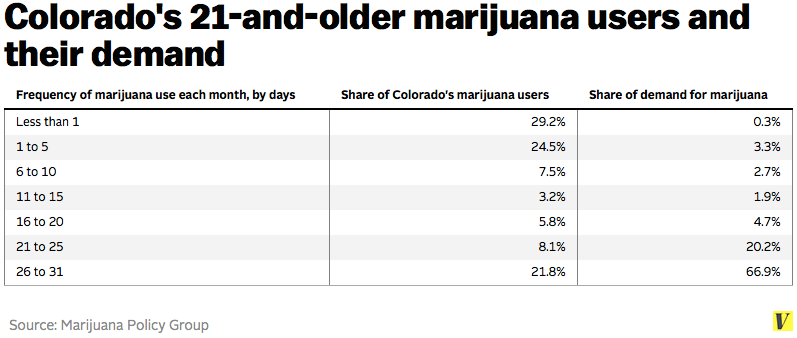
Jones said a similar situation could play out in DC, giving the local marijuana industry a financial incentive to exploit drug abusers. The alcohol and tobacco industries took similar tracks with their products, Jones argued, by marketing their product to potential addicts and teens.
As one example of the alcohol industry's abuse, Jones pointed out that liquor stores are much more common in minority, poor neighborhoods. "This is the real civil rights issue in DC," Jones said.
The campaign's name — "Two. Is. Enough. DC." — explicitly argued that alcohol and tobacco have already caused enough issues in American society by leading to hundreds of thousands of deaths and other problems each year. Jones said DC's problems with legal drugs will only get worse following marijuana legalization.
Read about the ballot initiative in Alaska
What was the ballot initiative in Florida?
:no_upscale()/cdn.vox-cdn.com/uploads/chorus_asset/file/2371622/Florida_1.0.jpg)
Some Florida residents already grow marijuana for medical purposes. (Carline Jean / Sun Sentinel / MCT via Getty Images)
Florida's Amendment 2 would have legalized marijuana to treat "debilitating medical conditions" such as cancer, multiple sclerosis, glaucoma, hepatitis C, HIV, AIDS, amyotrophic lateral sclerosis, Crohn's disease, Parkinson's disease, or "other conditions for which a physician believes that the medical use of marijuana would likely outweigh the potential health risks for a patient." The Florida Department of Health would have been required to set up regulations for medical marijuana cards and treatment centers.
Did it pass?
No. With all precincts reporting, the amendment obtained 57.6 percent approval, falling short of the 60 percent required for constitutional amendments under Florida law.
What made Florida different?
:no_upscale()/cdn.vox-cdn.com/uploads/chorus_asset/file/2371624/Florida_2.0.jpg)
The medical marijuana campaign could get younger voters out for Democratic gubernatorial candidate Charlie Crist. (Joe Raedle / Getty Images News)
In a typical election, polls suggested Florida's medical marijuana initiative would have easily passed with more than 50 percent of the vote. But because the measure is a constitutional amendment, Florida law required that it get 60 percent of the vote — and that made it all the more challenging in a midterm election year, when turnout among younger voters is lower.
"Of course it worries me," said Ben Pollara, director of United for Care, the organization behind them medical marijuana initiative, prior to Election Day. "We're a very politically divided state. I think you have to go back quite a while to find a candidate that's won with 60 percent."
Pollara said that Florida has waited long enough. With the evidence in favor of medical marijuana continuing to pile up, his campaign opted not to wait another two years — until 2016 — to put the issue on the ballot.
"The people of Florida have been begging for a medical marijuana law for years," Pollara said. "The politicians that we've elected to lead and legislate have not led or legislated on this issue or represented the interests and will of their constituents."
What did local supporters say?
:no_upscale()/cdn.vox-cdn.com/uploads/chorus_asset/file/2371628/Florida_3.0.jpg)
Marijuana flows out of a medicine bottle. (Shutterstock)
United for Care, which is leading the Yes on 2 campaign, cited the polls in Florida and across the country as evidence that Floridians are ready to legalize medical marijuana.
"This has been and continues to be a pretty non-controversial issue for Florida voters," said Pollara, director of United for Care. "People tend to believe that if a doctor recommends a course of treatment for a sick patient, that patient should be able to follow his doctor's orders without acting like a criminal."
Pollara argued that allowing medical marijuana is a matter of protecting patients' access to health care, especially when a treatment is recommended by a qualified physician. "Almost everybody has a personal connection to this issue," Pollara said. "If you or someone you love is sick and dying, if marijuana could potentially help with their illness and alleviate their symptoms, people are okay with that."
Asked about the opposition campaign's claims that the measure is loophole-ridden, Pollara pointed out that state regulators will be able to tweak rules to address who can or can't access marijuana and where dispensaries can be located.
What did local opponents say?
:no_upscale()/cdn.vox-cdn.com/uploads/chorus_asset/file/2371634/medical_marijuana_California.0.jpg)
Opponents of medical marijuana in Florida often point to California's medical marijuana system, which is largely unregulated. (Kevin Balluff / Moment via Getty Images)
No on 2 argued that the amendment was filled with loopholes and would have acted a lot like full, unregulated legalization. In TV ads and an eight-minute movie, the campaign uses slogans like, "There's nothing medical about this marijuana."
No on 2 pointed out the Food and Drug Administration hasn't approved the use of medical marijuana and that doctors can't write prescriptions for the drug since it's illegal under federal law. Indeed, marijuana's medicinal value has never been proven in the kinds of large-scale clinical trials the FDA requires for drugs going to market, which is one reason pot has never been reclassified in the federal government's scheduling system. But while there will be no prescriptions, the amendment requires patients obtain a physician certification, which would have been regulated by the state.
The campaign also argued there's nothing in the amendment that would prevent medical marijuana dispensaries from opening up near schools, churches, and restaurants. But the amendment explicitly tasked the Florida Department of Health with regulating all aspects of medical marijuana in the Sunshine State, including dispensaries, licensing, and distribution. The Health Department would have presumably taken location concerns into account when deciding what's allowed and not.
No on 2 also made multiple comparisons between Florida's amendment and California's medical marijuana law, with visuals of young people smoking pot in Venice Beach. But the Florida Department of Health would have handled the state's medical marijuana regulations from the start, while California legislators have failed for years to establish rules for medical pot.
No on 2 didn't return multiple calls and emails for comment.
Read about the ballot initiative in Alaska
What is the ballot initiative in Oregon?
:no_upscale()/cdn.vox-cdn.com/uploads/chorus_asset/file/2371638/Oregon_1.0.jpg)
Some places in Oregon value being eccentric. (George Rose / Getty Images News)
Oregon's ballot initiative, Measure 91, allows adults 21 and older to possess up to eight ounces and four plants of marijuana. It also legalizes production and sales, which the Oregon Liquor Control Commission will regulate. The measure taxes marijuana at the point of sale at $35 per ounce, with the revenue set aside for enforcement and education programs.
Did it pass?
Yes. With most precincts reporting, the amendment appeared to obtain 55.6 percent of the vote.
Can I legally smoke and buy pot right now?
:no_upscale()/cdn.vox-cdn.com/uploads/chorus_asset/file/2429442/ajg0MvCh4qq3vLpQx9oz6D8WIKppiBdEXSO7vzIhmBbh-tQnFzc5PuZfojdEI4rsa5DHvg_w1151-h543.0.png)
What made Oregon different?
:no_upscale()/cdn.vox-cdn.com/uploads/chorus_asset/file/2371640/Kevin_Sabet.0.jpg)
Kevin Sabet, co-founder of Smart Approaches to Marijuana, is one of the leading spokespeople against pot legalization. He also hosted several education campaigns in Oregon on the risks of pot. (Drew Angerer / Getty Images News)
The campaign in Oregon drew a lot of national attention over accusations that federal taxpayer money was being used to fund anti-legalization events.
Rep. Earl Blumenauer (D-OR), who supported the legalization campaign, called for an investigation into the allegations. But before any serious investigation took place, six of 13 events were canceled, and the rest continued with private funding.
"At the time, it looked blatantly political," Blumenauer said. "The people organizing [the events] are conflated with the people who are opposing the measure officially."
Kevin Sabet, who co-founded the anti-legalization Smart Approaches to Marijuana, was in charge of the controversial events. He said they were education stops about pot's health risks, not part of the campaign against Oregon's initiative.
"[N]o federal funding has been used for any campaigns nor was there ever a plan to use federal funding on marijuana lobbying," Sabet wrote in an email. "There were some routine marijuana education events happening but now those are going forward only with private funding. But those were never going to be federally funded lobbying events."
The controversy speaks to the blurred line between the federal government's roles as the chief enforcer of marijuana prohibition and as a major source of funding for anti-drug education campaigns. A big part of legalization campaigns is proving to voters that marijuana's legal classification as a schedule 1 substance is excessive, because it places pot in the same category as heroin. So when the federal government and federally funded entities step in to educate people about the health risks involved with pot use, it can often look like the feds are trying to interfere with an electoral campaign.
Unlike other states' initiatives, Oregon's is very open to changes by the legislature. Mark Kleiman, a drug policy expert at UCLA, argued the initiative is very flawed — the low taxes on marijuana would keep the price too low and the regulatory framework attached to the measure isn't stringent enough, making problematic use more affordable and likely. But he still supported the initiative, because it could force the state legislature to consider marijuana policies under a prohibition-free model that eliminates the black market but still treats drug abuse as a serious issue.
"There's a better chance the legislature will fix this than act on its own to legalize cannabis," Kleiman said. "If I were voting on this same proposition in California, I'd vote no, because in California the legislature does not generally monkey with [ballot] issues. Apparently, in Oregon that's not an issue; they do it all the time."
What did local supporters say?
:no_upscale()/cdn.vox-cdn.com/uploads/chorus_asset/file/2371642/Earl_Blumenauer.0.jpg)
Rep. Earl Blumenauer (D-OR) publicly supports marijuana legalization. (Tom Williams / CQ-Roll Call Group via Getty Images)
Oregon's marijuana legalization campaign, Yes on 91, argued that prohibition has fueled violent drug cartels and failed to deter children and teens from trying and using marijuana. With a regulated model, the campaign hopes to eliminate the black market and take on an approach that seems to have reduced teen tobacco and alcohol use in the past couple decades.
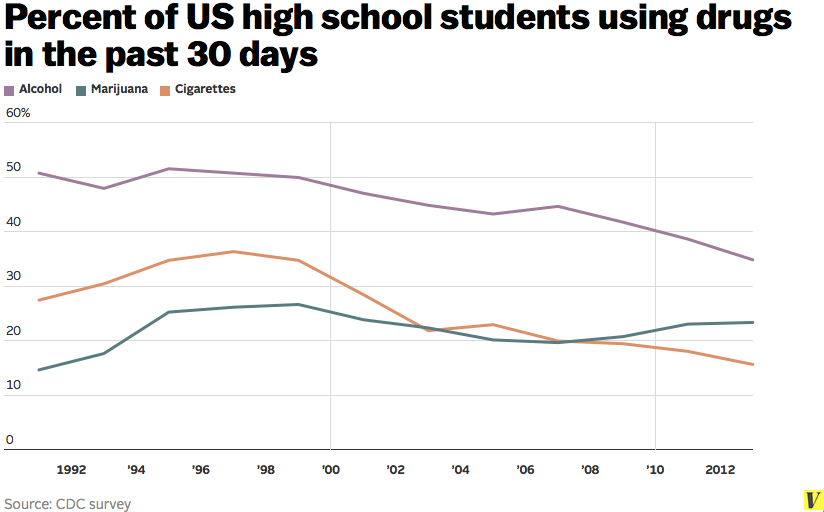
"Marijuana is a big business right now. It's a multibillion-dollar, huge business in the United States," said Rep. Blumenauer, who supported the initiative. "The problem is it's illegal, so it's not regulated, it's not taxed, and there aren't consumer protections."
It's this concern about an unregulated illegal market, Blumenauer explained, that drives his support for legalization and regulation.
"I don't want any young people using marijuana," Blumenauer said. "That's one of the reasons I'm working very hard on the Oregon campaign. Right now, nobody checks ID for a junior high girl who's buying dope. The illegal drug dealer has no license to lose."
The legalization initiative unlocks revenues, through marijuana taxes, for education campaigns that aim to prevent drug use and educate the public on its risks. This approach is similar to Colorado, which started its own education campaign to curtail teen marijuana use after voters legalized the drug.
In upcoming sessions of Congress, Blumenauer also hopes to address several of the federal hurdles facing state-legal marijuana businesses. Under current federal law, most pot stores and cultivators can't find banking options, since financial institutions are too nervous the federal government will crack down on banks and credit unions offering services to a federally illegal business. Pot shops and growers also can't file for several business tax deductions, driving their effective tax rates to as high as 70 percent.
"It is insane that hundreds of perfectly legal marijuana businesses in the 23 states that legalize adult or medical marijuana are forced into an all-cash model," Blumenauer said. "If you really care about money laundering, if you care about tax evasion, if you care about theft, you wouldn't do that."
Despite these concerns, Blumenauer said legalization in Colorado and Washington has worked well. "The sky hasn't fallen," he said. "To this point, what we've seen in both Colorado and Washington is a qualified success."
What did local opponents say?
:no_upscale()/cdn.vox-cdn.com/uploads/chorus_asset/file/2371644/marijuana_candy.0.jpg)
This candy contains marijuana. (Justin Sullivan / Getty Images News)
Mandi Puckett, director of No on 91, said Colorado and Washington's experiences with marijuana legalization have raised a lot of concerns about the commercialization of pot and road safety. "Oregonians need to pause and watch those two states and learn before jumping into something as serious as this," she said.
Puckett pointed to the marketing of marijuana-laced edibles, which are sometimes difficult to distinguish from candy products advertised to children. Edibles have led to numerous controversies and state hearings in Colorado. Legislators increased regulations on the products after a teenager ate a marijuana cookie and jumped to his death. New York Times columnist Maureen Dowd also wrote about her terrible experience after eating some marijuana candy.
"It just makes no sense why we would offer addictive products that look like products kids consume," Puckett argued. "There's already been many documented cases of kids accidentally ingesting these products."
Puckett also claimed that legalization could lead to more dangerous drugged drivers. In Colorado, the latest numbers from the state's department of transportation found more drivers involved in fatal crashes tested positive for marijuana after 2008, when medical marijuana dispensaries began opening widely across the state, but no further increase in 2013, the first full year of completely legalized possession. (Data for 2014, the first year of recreational marijuana sales, isn't available.)
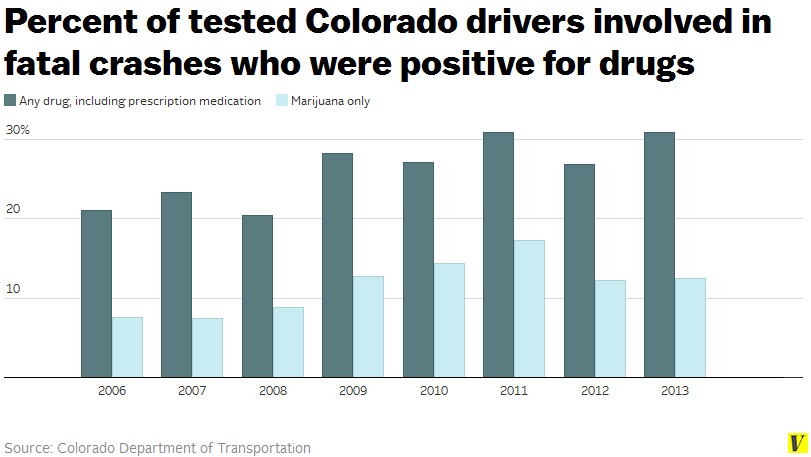
However, it's proven tricky to accurately test for drugged driving: fewer than half the drivers in this data set who were involved in a fatal accident were tested for drugs, and it's unknown if people were high at the time of their deaths, since marijuana can remain in someone's system for weeks — long after the drug's effects have worn off.
Puckett acknowledged the measure could be changed by state legislators and regulators to address some of her concerns but said that's not enough: "There are no safeguards in place to protect our kids, to protect our roads, to protect our health, and to protect what people are eating and consuming."
Read about the ballot initiative in Alaska
/cdn.vox-cdn.com/uploads/chorus_image/image/42295118/73245308_1_.0.0.jpg)
